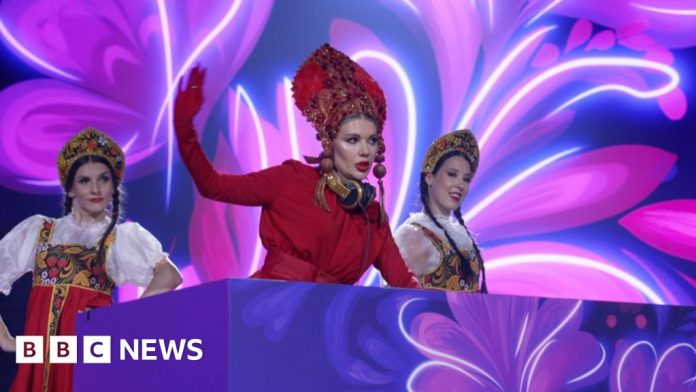Steve RosenbergRussia editor in Moscow
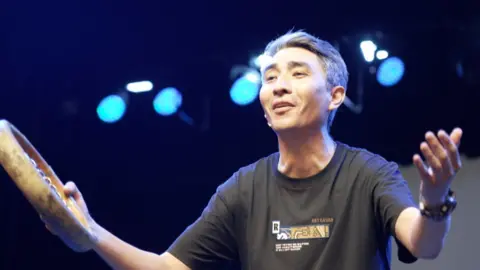 BBC
BBCAt a Moscow concert hall, Shohruhmirzo Ganiyev is crooning about love and his motherland, Uzbekistan.
“Put your legs together like a man,” suggests his voice coach and choreographer. “And spread your arms wider!”
It’s just a rehearsal, but Shohruhmirzo is singing his heart out. He’s performing traditional Uzbek melodies to a modern beat and playing a doira, the ancient drum of Central Asia.
Uzbekistan is among 23 countries competing at the Intervision Song Contest.
It’s Russia’s answer to Eurovision. With less kitsch – and more Kremlin.
Intervision 2025 is Vladimir Putin’s brainchild. He signed a decree reviving the Soviet-era songfest with the aim of “developing international cultural and humanitarian co-operation”.
The more obvious objective is creating an international song contest in which Moscow can actually take part. In 2022 Russia was banned from competing in Eurovision after its full-scale invasion of Ukraine.
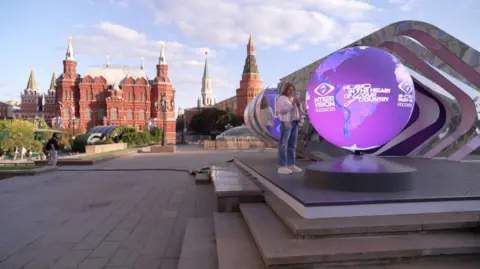
A pattern’s emerging.
When Team Russia was banned from the Olympic Games, Moscow tried to create alternatives, like the Games of the Future and the World Friendship Games.
Now the Kremlin’s come up with its own version of Eurovision.
But what does it look like and who is taking part?
For Intervision, the Russians have cast their musical net far and wide, inviting allies from Asia, Africa, the Middle East and Latin America. The starting line-up reflects the political and economic alliances of which Russia is part, like the Brics group of nations, the Shanghai Cooperation Organisation and the Commonwealth of Independent States.
The list of participating countries includes China, India, Brazil, South Africa, Vietnam, Venezuela, Qatar, Saudi Arabia and Madagascar: a very different musical map from Eurovision, and an opportunity for the Kremlin to show that, despite its invasion of Ukraine, Russia still has friends.
The United States, too, is taking part: a sign of the thaw in US-Russian relations since Donald Trump’s return to the White House.
Thaw doesn’t mean problem-free. America’s original Intervision entrant Brandon Howard pulled out on the eve of the contest.
“Unfortunately, I had some… family issues that happened here domestically, that I wasn’t [going] to be able to go abroad and do that,” the singer, who performs as B.Howard, tells me on a call from the US.
“However, I really believe that it’s such a wonderful event.”
“Were there some people who said to you ‘Brandon, you shouldn’t go, because of the war?'” I asked.
“Some fans would mention some things like that and expressed slight concern. However, for the most part, everyone was very supportive of me going there, being sent to be a beacon of light.”
B.Howard has been replaced by Australian-Greek singer Vassy who lives in Los Angeles.
“4.3 billion people live in the 23 participating countries,” boasted senior Kremlin official Sergei Kiriyenko. “That’s more than half the world’s population.”
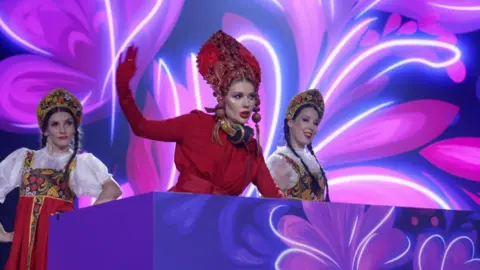
Mr Kiriyenko, President Putin’s deputy chief of staff, chairs the song contest’s supervisory board. He made a brief appearance this week at an Intervision press conference alongside Foreign Minister Sergei Lavrov and Deputy Prime Minister Dmitry Chernyshenko.
“I know some people think there’s an element of politics in Eurovision,” I tell Mr Lavrov. “But look who’s represented here: the Kremlin, the foreign ministry and the Russian government. Isn’t that proof that Intervision is a purely political or geopolitical project?”
“If the governments of some countries make no effort to create mechanisms for supporting culture, that’s their choice,” Mr Lavrov replies. “In our country the state is engaged in the promotion of the arts. Your question is rooted in the fear of competition.”
In Ukraine they fear something quite different: that Moscow is using Intervision to divert global attention from the war.
“The Ministry of Foreign Affairs of Ukraine considers that the Intervision 2025 song contest organised by Russia is an instrument of hostile propaganda and a means of whitewashing the aggressive policy of the Russian Federation,” the ministry stated back in May.
The war is on some people’s minds at Intervision.
“The scary thing is with the war, with whatever’s happening. These are the things we were thinking about,” says Renee Kruger from South African group Mzansi Jikelele.
“But we were assured: ‘Just come, guys, nothing’s wrong’. Obviously, we are [nervous], but we’re here and we’ve been treated very well.”
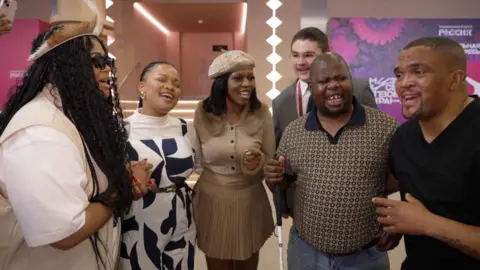
Representing Russia at Intervision 2025 is Yaroslav Dronov, better known by his stage name Shaman. Last year the European Union sanctioned him for “supporting actions and policies that undermine the territorial integrity and sovereignty of Ukraine.”
His previous hits include I’m Russian, a patriotic pop song that declares:
“I’m Russian, I go to the end… I’m Russian, to spite the whole world.”
Not exactly Love Shine A Light or Save Your Kisses for Me.
But Russia is using Intervision to project a softer image than the one forged by three-and-a-half years of its war in Ukraine.
At the official song contest draw to decide the running order, international delegations are being treated to a Russian feast, including cottage cheese pancakes and gingerbread sporting the Intervision logo. As folk dancers put on a spectacular show, volunteers hand out giant necklaces of bread rings, a symbol of Russian hospitality.
One by one the participants approach a gigantic samovar, select a tea cup and fill it with hot water. The magic mugs reveal the performance slot number for each country.
From the folk costumes to the blinis, the emphasis here is on tradition.
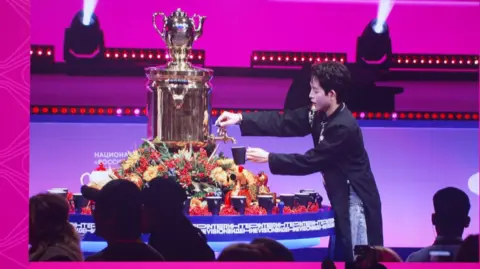
It’s the same with the songs. The official goal of the contest is to “get to know the unique cultural traditions and achievements of participating countries [and] promote universal, spiritual, family, cultural, ethical and religious traditions of different nations.”
The international performers have read the rulebook.
“My song tells about culture from Vietnam,” Vietnamese entrant Duc Phuc informs me. “I need to share the culture of Vietnam with everyone.”
“How were you chosen to represent your country?” I ask.
“The Ministry of Culture chose me.”
“Our song is about a woman called Maria,” says Brazilian entrant Tais Nader. “Maria is like any Brazilian woman. She works hard to live. But she’s always smiling and her eyes are shining.”
“Have you heard of Eurovision?” I ask.
“Actually, we searched online about Intervision and discovered Eurovision! Before, we didn’t know about Intervision or Eurovision. It’s new for us.”
For many Russians, too, Intervision is something new. In fact it is a ghost from communist times summoned from the grave of song contests past.
The original Intervision Song Contest was born behind the Iron Curtain at a time when East and West competed in everything. In the Cold War there was a space race, an arms race and culture wars, too.
From the mid-1950s Eurovision quickly established itself as a big deal in Western Europe, while in the Eastern bloc song festivals in Czechoslovakia and Poland acquired the occasional tag of ‘Intervision’.
There was, though, some crossover. Finland took part in both Eurovision and Intervision, and big names from the West made guest appearances in the East. Gloria Gaynor, Petula Clarke and Boney-M all performed at Intervision.
After the fall of communism Russia and Eastern Europe embraced the political changes sweeping the continent and were eager to compete in Eurovision. I saw that first hand in 1996 when, by a quirk of fate, I co-presented Russian TV’s Song for Europe competition to select a Eurovision entry.
During a guided tour of Russian TV, I’d got chatting to the show’s director. When I told him I was a huge Eurovision fan he’d asked me to come back that evening to help anchor the programme. I’ll never forget how excited everyone in the studio was that night: not only about Eurovision, but about Russia being part of the European family.
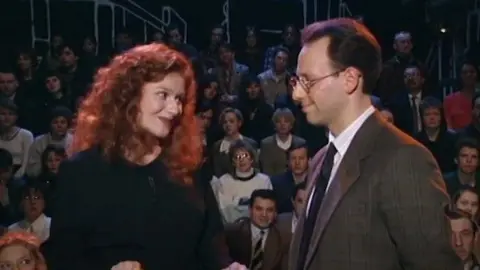 YouTube/RTR/Programma A/Pesnya dlya Evropy
YouTube/RTR/Programma A/Pesnya dlya EvropyBut as the Kremlin’s relationship with the West soured and Moscow’s attacks on Western liberalism and “non-traditional values” intensified, so did Russia’s beef with the Eurovision Song Contest.
Especially after Austrian drag queen Conchita Wurst won Eurovision in 2014.
“Giving first place to a bearded lady is a slight on humanity,” Russian MP Valery Rashkin told me at the time.
Mr Rashkin called on Russia to ditch Eurovision and organise its own Voice of Eurasia contest. Another MP suggested “Goodvision” as a possible replacement.
It was clear then that the Eurovision Song Contest and Russia were on a collision course. Eurovision made a point of welcoming the LGBTQ community, presenting itself as a showcase for inclusivity and diversity. In contrast, Russia launched a crackdown on gay rights, and has criminalised public expressions of LGBTQ identity.
There will be no sign of camp at the Intervision Song Contest.
 Intervision 2025
Intervision 2025But will people watch it? Will the Intervision singers and songs capture the public’s imagination across so many continents? The considerable time differences between the participating countries will likely preclude the kind of shared viewing experience you get with Eurovision.
And there’ll be no public vote. Just a jury: one member per country. But how will the voting take place?
“The voting system is specially invented by a very famous scientist and mathematician,” Russian TV’s Intervision commentator Yana Churikova tells me. “Specially for Intervision.”
Back in the rehearsal room, Uzbekistan’s entrant Shohruhmirzo Ganiyev admits he doesn’t know the intricacies of the voting system. He’s just excited to be here. So is his mother. She’s looking on proudly as her son rehearses.
Even though his country isn’t in Eurovision, Shohruhmirzo tells me that contest is famous in Uzbekistan. Right now, though, he’s focused on his performance here.
“I’m very happy to come to Intervision,” he tells me. “I’m leaving Eurovision in the past.”



